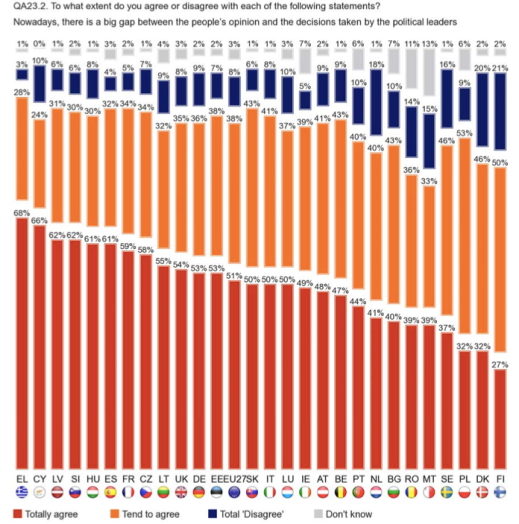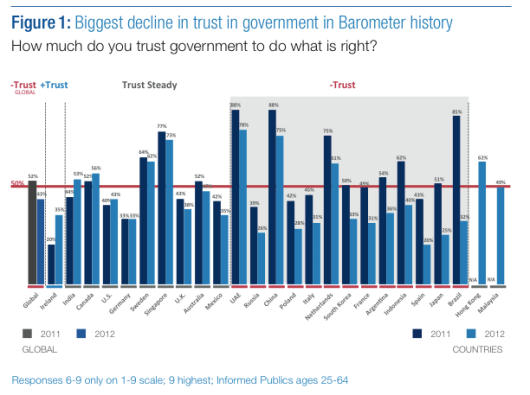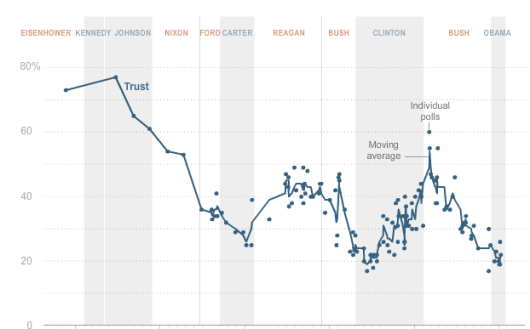[ted id=1547]
.
Political theorist Ivan Krastev believes that we are witnessing a “crisis of democracy.”
There appears to be little dissent in Europe or the United States about whether democracy is the best form of government, Krastev says in a foreboding talk given at TEDGlobal 2012. “Democracy is the only game in town,” says Krastev. “The problem is that many people have started to believe that it is not a game worth playing.”
Over the past 30 years, he says, trust in the efficacy of democracy has begun to erode. People feel less and less like their vote matters—that while they may be able to change who is in power, they are not able to affect what actions their government takes. The consequences? A decline in electoral turnout coupled with a growing sense of distrust of those in power.
To hear Krastev’s fascinating and counterintuitive thoughts on how this crisis came to be, listen to his talk. Below, an assortment of surveys about government mistrust, so you can judge the situation for yourself.
In his talk, Krastev shares some startling recent findings—that only 18% of Italian and just 15% of Greek citizens believe that their vote matters. Krastev pulled these numbers from the European Commission’s “Future of Europe” public opinion survey, published in April 2012. (Download the full results from the European Commission website.) In Denmark and Sweden, faith in government remains high, with 96% and 89% of survey respondents believing that their vote is meaningful. But by contrast, Romanian and Lithuanian citizens reported feeling largely powerless in their electoral system. Looking at the 27 countries of the European Union as a whole, only 52% of survey respondents said that they believe their vote matters inside their country. And just 33% believe that their vote matters in the context of the European Union at large.
Krastev also referenced another “Future of Europe” survey question in his talk. When asked to agree or disagree with the statement, “Nowadays, there is a big gap between the people’s opinion and the decisions taken by the political leaders,” an overwhelming majority of respondents answered “totally agree” or “tend to agree.” Overall, 89% of Europeans believe that there is a gap between policymakers and the public. See how it breaks down by country in the chart below.
Edelman, the global public relations firm, has conducted an annual “Trust Barometer” for 12 years running. (Download the full 2012 survey at the Edelman website.) In 2012, the survey showed the biggest decline in government trust in the survey’s history. In 2011, 52% of survey respondents across the globe said that they trusted their government to do what is right. This year, the number plummeted to 43%. While in several countries—including the United States—the government trust rating held steady, in Brazil it dropped a whopping 53 percentage points. Meanwhile, Japan suffered a 26-point decline in government trust, while South Korea saw a 17-point drop. See the breakdown by country in the chart below.
In the United States, trust in the government has declined rapidly over the past few decades. The Pew Research Center has kept data on public trust in the government since 1958, and released the chart below in 2010. In 1958, more than 70% of those surveyed trusted the government to make good decisions. In 2010, the number plummeted to under 20 percent. (Though there were temporary spikes in the 1980s and the early 2000s.) While Pew’s 2011 survey showed that those saying they were “angry” at the government had declined from 23% to 14%, it’s hard not to notice the extreme downward trend on the chart below. (Download the complete 2011 “Attitudes Toward Government Survey” at the Pew website.)
So, what can be done? While many believe that the key to restoring a sense of trust in the government is to create greater transparency and openness, Ivan Krastev worries that this will not be enough.
“Transparency is not about restoring trust in institutions. Transparency is the politics of managing mistrust,” says Krastev. He suggests that when officials are watched with an eagle eye, fewer talented people will want to enter the field of governance. And transparency is relative: “Any unveiling is also veiling. No matter how transparent our governments want to be, governments will be selectively transparent.”
Stay tuned for a Q&A with Ivan Krastev where we ask him the very important question: What can be done to make governments more trustworthy?



Comments (34)
Pingback: open data, civil society, Open Knowledge Foundation, participation, OGP, Sunlight Foundation, Opora, Parltrack, #App115, Open Knowledge Foundation, Google | Open Government Blog
Pingback: Journalism of the future should be less concerned with the present | John Lloyd
Pingback: Is democracy in crisis? A Q&A with TED ebook author Ivan Krastev, who says “yes” | Krantenkoppen Tech
Pingback: Is democracy in crisis? A Q&A with TED ebook author Ivan Krastev, who says “yes” | Risi Kapital
Pingback: New TED Book: In Mistrust We Trust | Krantenkoppen Tech
Pingback: What’s Behind The Light « Carpe Bootium
Pingback: How Pervasive Has Government Distrust Gotten? [video] | Conscious Life News
Pingback: Krise der Demokratie – Belegt von EU-Studie « Café Lascaux – von der Höhlenwand zur Pinnwand